Share
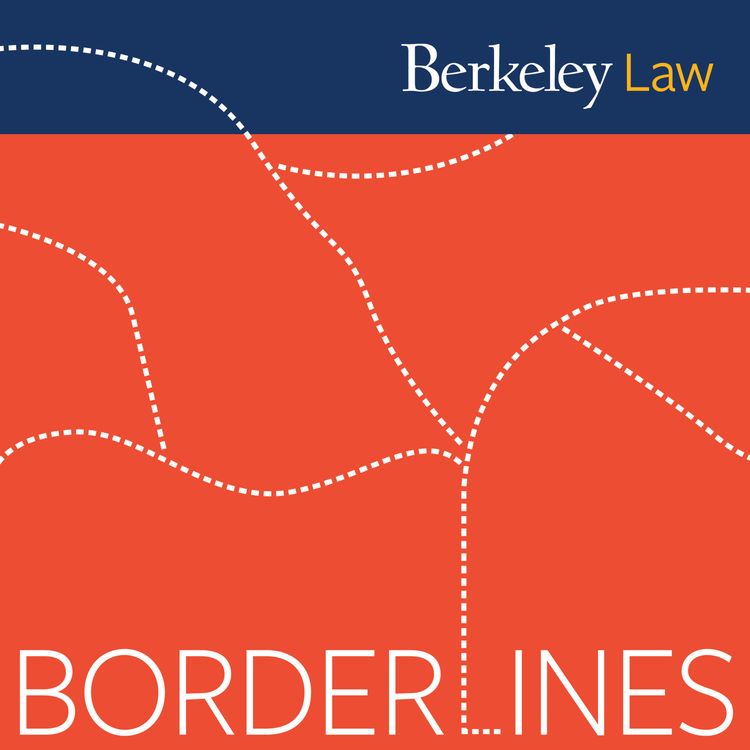
Borderlines
Intisar Rabb, Interpreting MetaCanons
This special episode of Borderlines features Islamic legal studies and comparative and foreign law innovator Professor Intisar Rabb, talking about her leading research on shared methods of interpretation for textualists across different systems. The podcast builds upon ideas raised at the 2022 Irvine Tragen Lecture on Comparative Law at UC Berkeley School of Law.
Intisar A. Rabb is a Professor of Law & History and the faculty director of the Program in Islamic Law at Harvard Law School. She has published widely on Islamic law in historical and modern contexts, including the book Doubt in Islamic Law (Cambridge University Press 2015) and numerous articles on Islamic constitutionalism, legal canons, and the history of the Qur'an text. She has conducted research in Egypt, Iran, Syria, and elsewhere. In 2015, Professor Rabb and co-partners launched SHARIAsource – an online portal designed to provide universal access to Islamic law and history resources and galvanize research using AI tools.
In Episode Eight of Borderlines, listeners will learn about the history and resurgent use of legal canons – principles of interpretation that judges derive from common law and use when resolving issues unclear from the text alone – including their ancient role in Islamic law and modern application at the U.S. Supreme Court. Shared similar legal canons threading across systems with like linguistic features, known as metacanons, are broken down. Dialogue covers how statutory interpretation connects to civil and criminal legal systems, the dubious term “civilized nations” in international law, and battling stereotypes of Islamic law with new scholarly resources and coded data.
Borderlines from Berkeley Law is a podcast about global problems in a world fragmented by national borders. Our host is Katerina Linos, Tragen Professor of International Law and co-director of the Miller Institute for Global Challenges and the Law. In each episode of Borderlines, Professor Linos invites experts to discuss cutting edge issues in international law.
For a transcript, please visit the episode page on the Berkeley Law podcast hub.
More episodes
View all episodes
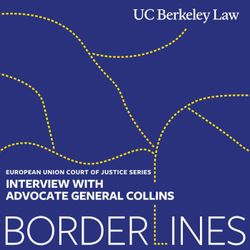
40. European Union Court of Justice Series: Interview with Advocate General Anthony Collins
01:01:09||Ep. 40Episode #15 of the Borderlines CJEU Series features CJEU Advocate General Anthony Michael Collins in conversation with Professor Mark Pollack (Temple University). Appointed by the Member States as Advocate General to the Court of Justice in 2021, where he served in that role until 2024, Advocate General Collins’s career also includes work as a référendaire at the Court of Justice, as a judge at the General Court of the European Union, and as a Barrister-at-Law and Senior Counsel at the Bar of Ireland. The interview features Advocate General Collins’s incisive perspective on the broader set of legal issues and challenges facing the Court today. Learn how the General Court of the European Union is both different from and similar to the CJEU, and gain a rare inside glimpse into cases such as C-204/21, Commission v. Poland (4) and its relationship to Article 19 of the Treaty on European Union. The singular role of Advocates General at the Court is further elucidated for listeners.About this series: UC Berkeley Law’s Borderlines podcast host, Professor Katerina Linos, and guest co-host, Professor Mark Pollack (Temple University), conduct a special interview series profiling the Judges and Advocates General serving at the Court of Justice of the European Union (CJEU) in Luxembourg.For a full transcript, show notes and links, please visit the episode page on the Berkeley Law Podcast Hub. Thanks for listening!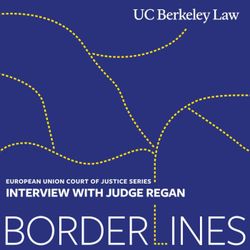
39. European Union Court of Justice Series: Interview with Judge Eugene Regan
56:19||Ep. 39Episode #14 of the Borderlines CJEU Series features CJEU Judge Eugene Regan in conversation with Professor Katerina Linos. Judge Regan has served at the Court of Justice since October 2015, following a distinguished career in agricultural policy and as a Barrister in Dubin and member of the Irish Senate. In the interview, Judge Regan shares insights into the impacts of the United Kingdom’s 2020 withdrawal from the EU (“Brexit”) on Europe and the Court. He also educates on differences between common and civil law approaches to jurisprudence, the CJEU process for drafting single collective rulings and paths for cases to reach the Court, and the prominent role of Judge Rapporteurs. Cases discussed cover issues of national and international resonance, including border controls, rule of law enforcement, balancing privacy rights and public security, and the role of courts in examining and regulating governmental legislation.About this series: UC Berkeley Law’s Borderlines podcast host, Professor Katerina Linos, and guest co-host, Professor Mark Pollack (Temple University), conduct a special interview series profiling the Judges and Advocates General serving at the Court of Justice of the European Union (CJEU) in Luxembourg.For a full transcript, show notes and links, please visit the episode page on the Berkeley Law Podcast Hub. Thanks for listening!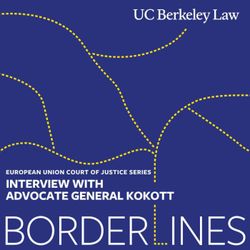
38. European Union Court of Justice Series: Interview with Advocate General Juliane Kokott
46:25||Ep. 38Episode #13 of the Borderlines CJEU Series features CJEU Advocate General Juliane Kokott in conversation with Professor Katerina Linos (Berkeley Law) and Professor Mark Pollack (Temple University). Appointed to the Court of Justice in 2003 after a prolific and distinguished academic and professional career, Advocate General Kokott has delivered nearly 700 case opinions as of this episode’s publication. The interview illustrates the Court’s impactful role, covering cases on regulating EU industry with major U.S. firms, wearing religious garments in the workplace, and pregnancy rights in the case of surrogacy. Listeners will glean a better understanding of the Advocate General’s unique role at the Court, and hear Advocate General Kokott discuss the Court’s enlargement and shift away from reviewing technical matters, two important changes that have occurred in the Court during her tenure.About this series: UC Berkeley Law’s Borderlines podcast host, Professor Katerina Linos, and guest co-host, Professor Mark Pollack (Temple University), conduct a special interview series profiling the Judges and Advocates General serving at the Court of Justice of the European Union (CJEU) in Luxembourg.For a full transcript, show notes and links, please visit the episode page on the Berkeley Law Podcast Hub. Thanks for listening!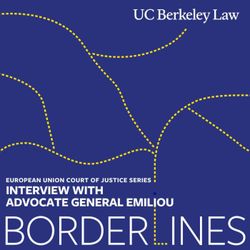
37. European Union Court of Justice Series: Interview with Advocate General Nicholas Emiliou
48:30||Ep. 37Episode #12 of the Borderlines CJEU Series features CJEU Advocate General Nicholas Emiliou joining Professor Mark Pollack (Temple) in conversation. Advocate General Emiliou was appointed as an Advocate General at the Court of Justice of the European Union in October 2021, following a long and illustrious academic and diplomatic career. In this episode, Advocate General Emiliou reflects on his decision to pursue his current role, highlighting the intellectual freedom it grants him to express independent legal opinions on complex and politically sensitive cases. He also offers insight into how his extensive diplomatic experience informs his approach at the CJEU and examines how the Court addresses key contemporary issues, such as migration, asylum policy, and the protection of fundamental rights.About this series: UC Berkeley Law’s Borderlines podcast host, Professor Katerina Linos, and guest co-host, Professor Mark Pollack (Temple University), conduct a special interview series profiling the Judges and Advocates General serving at the Court of Justice of the European Union (CJEU) in Luxembourg.For a full transcript, show notes and links, please visit the episode page on the UC Berkeley Law Podcast Hub. Thanks for listening!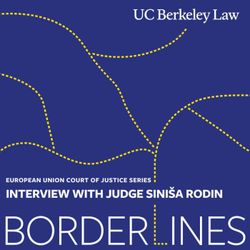
35. European Union Court of Justice Series: Interview with Judge Siniša Rodin
01:01:32||Ep. 35Episode #11 of the Borderlines CJEU series features Judge Siniša Rodin in conversation with Professor Katerina Linos (Berkeley). Appointed as a Judge at the Court of Justice in 2013, Judge Rodin discusses his remarkable career, ranging from becoming a distinguished Professor of EU law at the University of Zagreb to serving as a member of Croatia’s Constitutional Amendment Committee. Intertwined with Judge Rodin’s experiences is a discussion of Croatia’s accession to the EU, and how from Judge Rodin’s perspective, EU membership initially felt like “science fiction.”Listeners will come away with a better understanding of the European Citizens Initiative and specifically, the case One of Us and hear about the Court’s role interpreting “gray zones” between the powers of the EU and exclusive competences of the Member States. Judge Rodin also covers current trends impacting the Court, such as anonymizing cases with invented names and increase in length of judgments. About this series: UC Berkeley Law’s Borderlines podcast host, Professor Katerina Linos, and guest co-host, Professor Mark Pollack (Temple University), conduct a special interview series profiling the Judges and Advocates General serving at the Court of Justice of the European Union (CJEU) in Luxembourg. For a full transcript, show notes and links, please visit the episode page on the Berkeley Law Podcast Hub. Thanks for listening!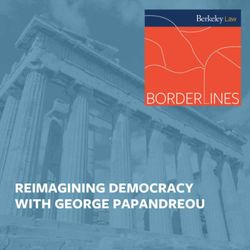
36. Reimagining Democracy with George Papandreou
35:34||Ep. 36Episode 36 of Borderlines brings former Greek Prime Minister George Papandreou into dialogue with host Professor Katerina Linos, to share visionary insights about authoritarian threats undermining global democracy and citizen-centered solutions. Currently serving as Rapporteur for Democracy at the Council of Europe, Mr. Papandreou discusses his storied family of leaders in Greece and the United States and surviving violent coups, rightwing cabals and austerity crises. Listeners will learn about his diplomatic advances while Foreign Minister which helped humanize relations between Greece and Türkiye, and how innovating on the values of ancient Greece as the world’s first democratic state could counter today’s polarization. Mr. Papandreou made major (if ultimately unsuccessful) efforts to resolve the “Cyprus problem” – a topic Professor Linos discusses with him in this interview and during her interview with CJEU Judge Lycourgos, who similarly worked on this complex issue.Berkeley Law’s Borderlines features exclusive content with the world’s most influential legal minds. Check out the ground-breaking European Union Court of Justice profiles series and recent interviews with former top international court leaders, ICJ President Donoghue and ICC President Hofmański. Be sure to subscribe so you don’t miss an episode!For a full transcript, show notes and links, please visit the episode page on the Berkeley Law Podcast Hub. Thanks for listening!
34. European Union Court of Justice Series: Interview with Advocate General Jean Richard de la Tour
33:00||Ep. 34Episode #10 of the Borderlines CJEU series features Advocate General Jean Richard de la Tour in conversation with Professor Mark Pollack (Temple). Advocate General Richard de la Tour was appointed to the French advocate-general seat at the Court of Justice in March 2020 and reappointed in 2024.In this episode, listeners will learn about the rigorous process of appointment to the CJEU and the unique responsibilities of an Advocate General. The conversation also highlights cases involving gender identity rights, data privacy violations, the criteria for granting or revoking refugee status, the political rights of non-national EU citizens, and the protection of the rights of asylum seekers. Advocate General Richard de la Tour also shares his views on the evolving role of the CJEU in safeguarding fundamental rights, the growing importance of data protection, and potential future cases involving artificial intelligence.About this series: UC Berkeley Law’s Borderlines podcast host, Professor Katerina Linos, and guest co-host, Professor Mark Pollack (Temple University), conduct a special interview series profiling the Judges and Advocates General serving at the Court of Justice of the European Union (CJEU) in Luxembourg.For a full transcript, show notes and links, please visit the episode page on the Berkeley Law Podcast Hub. Thanks for listening!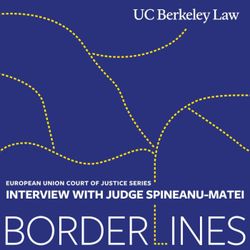
33. European Union Court of Justice Series: Interview with Judge Octavia Spineanu-Matei
30:31||Ep. 33Episode #9 of the Borderlines CJEU Series features CJEU Judge Octavia Spineanu-Matei in conversation with Professor Mark Pollack (Temple University). Judge Spineanu-Matei was appointed to the Court of Justice in 2021, after serving since 2016 as a Judge on the General Court. Judge Spineanu-Matei previously served as a justice in the Romanian judiciary for over 25 years. Judge Spineanu-Matei discusses her robust career path, highlighting major moments such as her first case concerning EU law, Circul Globus, and the process of appointment to the CJEU, being first chosen at the national level then vetted by the Article 255 Committee.About this series: UC Berkeley Law’s Borderlines podcast host, Professor Katerina Linos, and guest co-host, Professor Mark Pollack (Temple University), conduct a special interview series profiling the Judges and Advocates General serving at the Court of Justice of the European Union (CJEU) in Luxembourg.For a full transcript, show notes and links, please visit the episode page on the Berkeley Law Podcast Hub. Thanks for listening!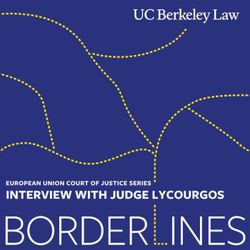
32. European Union Court of Justice Series: Interview with Judge Constantinos Lycourgos
48:44||Ep. 32Episode #8 of the Borderlines CJEU Series features CJEU Judge Constantinos Lycourgos in conversation with Professor Katerina Linos (Berkeley). Appointed as a Judge at the Court of Justice in 2014, Judge Lycourgos has served as President of Chamber there since October 2021. His interview highlights major points in Cyprus’s history and entry into the EU, the roles played by the Judge Rapporteur and Advocate General at the Court, the decision-making process and how the Court “walks the line between EU and national competences,” and why nearly all major European crises ultimately find their way before the Court.About this series: UC Berkeley Law’s Borderlines podcast host, Professor Katerina Linos, and guest co-host, Professor Mark Pollack (Temple University), conduct a special interview series profiling the Judges and Advocates General serving at the Court of Justice of the European Union (CJEU) in Luxembourg.For a full transcript, show notes and links, please visit the episode page on the Berkeley Law Podcast Hub. Thanks for listening!